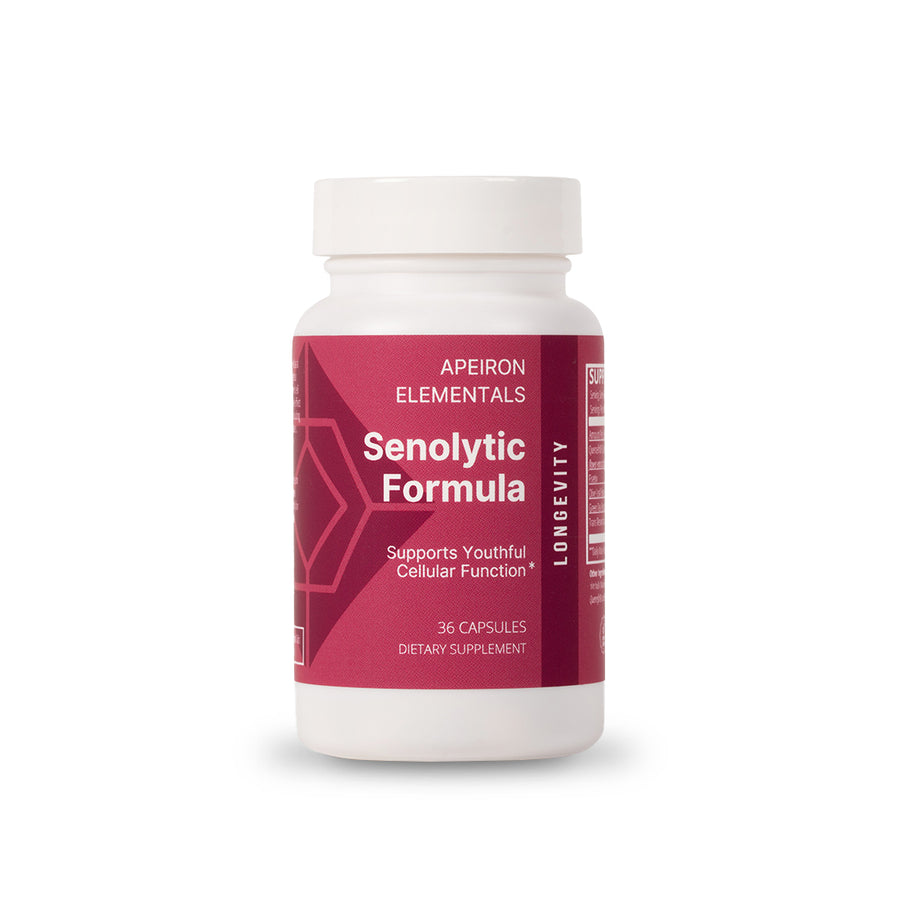
Senolytics are a class of compounds that target senescent cells, which have stopped dividing and contribute to aging and disease. While initially protective, these cells can accumulate over time, causing inflammation and contributing to age-related conditions.
Senolytics remove senescent cells, offering a path to slowing down the aging process. As research advances, senolytic supplements are gaining attention as powerful tools in anti-aging strategies.
What Are Senescent Cells?
Senescent cells have ceased to divide but remain active in the body. They often accumulate with age due to various stressors, including DNA damage and oxidative stress.
They play a protective role by halting cell division in response to damage, such as stopping the uncontrolled growth of cancer cells. However, they can also become problematic as they accumulate.
As these cells build up, they release harmful compounds like inflammatory cytokines that contribute to chronic inflammation. These cytokines can damage nearby healthy cells, disrupt tissue repair, and impair organ function. As a result, their presence is linked to age-related conditions such as heart disease, Alzheimer’s, osteoporosis, and arthritis. Research published in the Annual Review of Pathology by Annual Reviews outlines how senescent cells drive inflammation and contribute to age-related decline.
How Do Senolytics Work?
Senolytics specifically target and eliminate senescent cells. These compounds work by interfering with the anti-apoptotic pathways in senescent cells—pathways that prevent the cell from undergoing programmed cell death (apoptosis). By breaking these pathways, senolytics allow senescent cells to die naturally.
Some senolytic compounds, like dasatinib and quercetin, have demonstrated promising results in laboratory settings. Fisetin has been shown to selectively eliminate senescent cells and influence important cellular pathways such as mTOR (involved in aging), NF-κB (inflammation), and sirtuins (proteins linked to longevity and cellular repair), while quercetin acts as both an antioxidant and anti-inflammatory, further aiding in the removal of these cells. The result is a decrease in the overall number of senescent cells, which helps reduce inflammation and improve the function of surrounding tissues.
The Benefits of Senolytic Supplements
Senolytics have shown promising effects in both animal models and early human studies. Research indicates these treatments may support cardiovascular health, improve insulin sensitivity, enhance neurological function, and reduce age-related symptoms. A review published in the Journal of Internal Medicine by John Wiley & Sons highlights the emerging therapeutic potential of senolytics across multiple age-related conditions.
● Cardiovascular Health: In animal studies, senolytic treatments have improved vascular function, reduced artery calcification, and enhanced vessel sensitivity to neurotransmitters. This may help improve heart health by reducing the risk of strokes and improving overall circulation.
● Bone Health: Senolytics have shown promise in treating osteoporosis and arthritis. In animal models, senolytic compounds have reduced bone resorption and promoted bone formation. This can help improve bone density and reduce the risk of fractures in aging individuals.
● Neurological Function: Animal studies suggest that senolytic supplements may reduce brain inflammation and support cognitive health. These compounds also reduce Alzheimer’s-related changes in the brain and may help protect against age-related cognitive decline. The review by John Wiley & Sons outlines the emerging link between senolytics and neurological function.
● Physical Function: In research involving aging mice, senolytic treatment has shown improvements in physical function. These improvements appeared in daily activities, treadmill performance, and grip strength. This suggests that senolytic compounds may help increase muscle strength and physical endurance in older individuals.
Senolytic Supplements for Anti-Aging
Senolytic supplements are gaining popularity as part of anti-aging strategies. These supplements work by removing senescent cells, thus slowing down the aging process and improving overall health. While research is still in its early stages, there is growing interest in senolytics to address aging at a cellular level.
Senolytic supplements may help with various age-related issues, such as reducing inflammation, supporting cardiovascular and bone health, and enhancing cognitive function. Senolytics offer a novel approach to improving longevity and well-being by targeting the cells responsible for aging and disease.
How to Incorporate Senolytics into Your Routine
If you want to add senolytics to your anti-aging regimen, it is important to choose high-quality supplements. Many senolytic compounds, such as quercetin and fisetin, are available in supplement form. It is important to consult with a healthcare provider before beginning any new supplement to ensure it is safe and effective for your needs.
In addition to senolytic supplements, maintaining a healthy lifestyle that includes regular exercise, a balanced diet, and proper sleep can further support your body’s ability to combat the effects of aging.
Supporting Your Anti-Aging Journey
At Apeiron Elementals, we understand the importance of maintaining vitality as we age. Our senolytic supplements target senescent cells, helping improve your body’s function and fight the signs of aging. We focus on providing high-quality, physician-backed supplements to support your journey toward lifelong health.
References:
Kirkland, James L., and Tamara Tchkonia. "Senolytic Drugs: From Discovery to Translation." Journal of Internal Medicine, vol. 288, no. 5, Nov. 2020, pp. 518–536. Wiley Online Library, https://doi.org/10.1111/joim.13141.
The Elementals Blog
Evidence-based guides for optimal performance and healthy living.





























